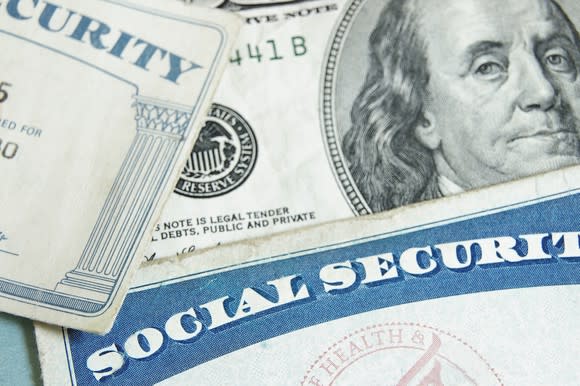Social Security's maximum benefit: Is there any way you'll get it?
Most retirees need as much income from Social Security as they can get. That's what makes Social Security's maximum benefit so appealing: The prospect of getting the largest possible monthly benefit check from Social Security seems like an obvious solution to retirees' financial worries. Unfortunately, getting the maximum amount that Social Security will pay takes a lot of effort, and almost no one will be able to hit that theoretical maximum amount. Below, we'll look at Social Security's maximum benefit and why most people will inevitably fall short of receiving it.

Image source: Getty Images.
What Social Security's maximum benefit is
Each year, the Social Security Administration announces the maximum monthly Social Security benefit that's available to retirees. For 2017, the maximum benefit for someone retiring at full retirement age will be $2,687 per month. That's up by $48, or 1.8%, from 2016's maximum benefit of $2,639 per month. On an annual basis, that amount will produce nearly $32,250 in income in 2017.
However, one thing that affects the true maximum benefit from Social Security is the age at which you decide to file for benefits. The amount above assumes that you take benefits at full retirement age, which is 66 for those who were born in 1951 and are retiring in 2017. If you claim your benefits earlier than that, then you'll get less. For instance, if you claim benefits at the earliest possible age of 62 in 2017, then your maximum possible benefit would be $2,153 per month -- about a fifth less than the full-retirement-age maximum. On the other hand, if you turn 70 in 2017 and take benefits, then your maximum is much higher at $3,538 per month.
RELATED: The 25 best cities for stretching your retirement nest egg:
This is because the longer you wait to claim your Social Security benefits, the larger they will be. This makes sense when you think about it. If you file for Social Security early, then you'll naturally get more checks during your lifetime, and thus the Social Security Administration compensates by reducing the amount of your monthly payments.
Yet the main reason why most people don't end up getting anything close to the maximum Social Security benefit has little to do with when they retire. It's because most Americans don't earn enough money throughout their careers.
What it takes to get the most from Social Security
To understand why most people don't get the maximum benefit from Social Security, it's useful to think about what a worker has to do in order to earn the maximum. Social Security looks at the highest-earning 35 years of your work history in order to determine your benefit amount, adjusting earlier years for inflation and then coming up with your average indexed monthly earnings. From there, average monthly earnings get plugged into a formula that determines their monthly retirement benefit. Social Security is a progressive program, which means it's designed to replace more pre-retirement income for low earners and less for high earners. For example, the program will replace 90% of monthly income up to $856 but only 15% of monthly income beyond $5,157.
Social Security only gives workers credit for the amount they earn up to a certain wage cap -- which for 2017 is $127,000. That's because the Social Security payroll tax is not assessed on income above $127,000, and thus it's only fair that income above that threshold isn't factored into your benefits. For instance, if you earn $200,000 in 2017, then Social Security will treat you as if you had earned $127,000.
That means in order to qualify for Social Security's maximum benefit, must have earned at least the wage base limit for 35 years of your career. Obviously, most Americans don't earn anywhere near that amount. Even those who do currently earn that much won't qualify for the maximum benefit if they haven't earned that much for 35 full years.
The silver lining in Social Security's benefit formula
Even if you don't earn the maximum, however, there's good news for those who have high earnings. Because top earners only get $0.15 in extra monthly benefits for every dollar they earn above a certain threshold, those who earn slightly less than the maximum will only see their benefits fall by a slight amount. For example, those who turn 66 in 2017 and get the maximum amount will have average indexed monthly earnings of $8,843. However, if their monthly earnings were $100 lower, at $8,743, then they'd only get $15 less than the maximum benefit.
For most Americans, earning a salary of $127,200 or more is an unrealistic goal, and so the maximum benefit from Social Security will remain out of reach. Yet that shouldn't stop you from working toward earning as much as you can -- both to increase your retirement savings and to boost your future Social Security retirement benefit.

